 —————
—————
Hellraisers Journal – Friday January 16, 1914
Houghton, Michigan – Cheering Crowd Meets Moyer and Tanner at Station
From the Miners Magazine of January 15, 1914:
From the Miners’ Bulletin of January 9, 1914:
 —————
—————
Hellraisers Journal – Friday January 16, 1914
Houghton, Michigan – Cheering Crowd Meets Moyer and Tanner at Station
From the Miners Magazine of January 15, 1914:
From the Miners’ Bulletin of January 9, 1914:
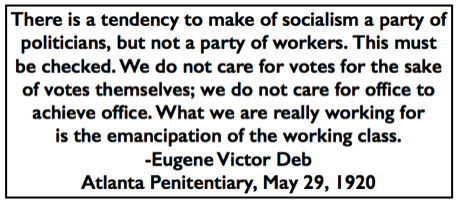 ———-
———-
Hellraisers Journal – Friday August 6, 1920
Atlanta Penitentiary – Debs Working for Release of All Class-War Prisoners
From The Butte Daily Bulletin of August 4, 1920:
DEBS STILL WORKING FOR RELEASE OF FELLOW MEN
—–(Special United Press Wire.)
New York, Aug. 4.-Added impetus to the movement to secure the release of all political and class war prisoners from the federal and state prisons has been noted here since the receipt of word from Eugene V. Debs, who requested that efforts of individuals and organizations in his behalf alone be ceased and energies turned to the release of all.
Debs, who is the nominee of the Socialist party for president, is undergoing imprisonment at Atlanta federal penitentiary for his struggles in behalf of the workers.
———-
 ———-
———-
Hellraisers Journal – Sunday June 27, 1920
Atlanta Federal Penitentiary – Debs Greets Stedman with a Kiss
From the Appeal to Reason of June 26, 1920:
President Should Pardon Debs
William M. Reedy, in Reedy’s Mirror.
President Wilson should order the release from prison of Eugene V. Debs. He will, if he has any place in that heart which so throbs for humanity in the abstract, for the individual man. He will, if he has any admiration for a man whose convictions defy prison and death. He will, if he has any brotherliness for another who obeys those “voices” which Wilson himself hears and obeys as Socrates did his demon. He will not doom Debs to death for his opinions based on a higher law than that of that man-made, Hobbesian God, the State. I understand that Mr. Debs is in a much weakened condition as the result of his confinement, that his physical plight is such as to make his immurement during hot weather extremely dangerous.
 ———-
———-
Hellraisers Journal – Tuesday June 1, 1920
Atlanta Penitentiary – Eugene Debs Accepts Nomination for President
From The Atlanta Constitution of May 30, 1920:
DEBS POINTS WAY FOR SOCIALISTS
———-
Praises Russian Russian Revolution, and
Criticises Platform When Notified of
Presidential Nomination.
—–Expression of keen but friendly criticism of the socialist platform, as adopted in New York city, and of sentiments of sympathy with the Russian revolution, which Eugene V. Debs declared the greatest achievement of all time, were the features of the unique ceremony conducted in the federal prison in Atlanta Saturday morning, when the prisoner was formally notified by a committee of his party that he had been nominated for president by the socialists.
Every possible courtesy was extended the committee and the aged convict by the prison authorities. There were some fifteen people present at the notification, some seven of them socialists, perhaps as many newspaper men, and a fellow prisoner of Debs-Joe Caldwell, of Rhode Island, a member of the communist party.
The exercises were held in a beautifully lighted room on the ground floor, with a nice view through the barred windows. Just before this took place. Debs met his friends in the hallway and kissed each one, four men and one woman-Dr. Madge Patton Stephens, from Terre Haute, his home town, and a friend of his family. Then, for half an hour, a moving picture man snapped all conceivable poses of the nominee and his committee.
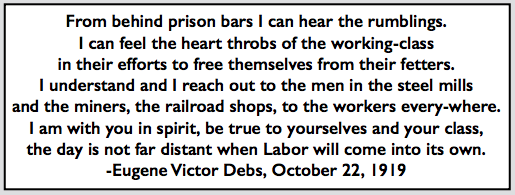 ———-
———-
Hellraisers Journal – Sunday May 16, 1920
New York, New York – Socialists Nominate Convict 9653 for President
From the Washington Herald of May 14, 1920:
CONVICT 2253 MADE NOMINEE FOR PRESIDENT
———-
Socialist Convention Delegates in Tears
at Mention Of Eugene V. Debs.
—–CHEER SOVIET RUSSIA
—–
Stedman, Chicago Lawyer, Running Mate
on “Conservation Platform.”
—–
New York, May 13.-Eugene Victor Debs, convict 2253 [9653] in Federal Prison at Atlanta, where he is serving a ten-year sentence for violation of the espionage act, today was nominated as candidate for President of the United States by the Socialist party convention. Seymour Stedman, of Chicago, attorney and close friend of Debs, was chosen as candidate for Vice President.
Radicals in the convention experienced their second defeat at the hands of the conservatives when an attempt to substitute the left wing platform, declaring for a soviet form of government in the United States, was defeated by a vote of 74 to 55.
Swept by an emotion which brought tears to their eyes, the delegates sprang to their feet at the first mention of the name of Debs, whose nomination was proposed by Edward Henry, of Indiana. For thirty minutes delegates and visitors shouted and gesticulated, sang [the “Internationale”] and cheered…..
[Emphasis added.]
Note: The Herald is using “Convict 2253,” the number given to Debs at Moundsville Prison. When Debs was transferred to Atlanta in June of 1919, he became “Convict 9653.”
 ———-
———-
Hellraisers Journal – Monday March 19, 1900
Indianapolis, Indiana – S. D. P. “Unity” Convention Nominates Debs
From San Francisco’s Class Struggle of March 17, 1900:
[Part II of II.]
FOURTH DAY [March 9th].
J.C. Chase, who served as chairman on the third day, was again elected to preside.
A motion to elect two delegates to the International Congress at Paris in 1900 was carried. Eugene Dietzgen was elected as one delegate, and on motion the election of the second delegate was referred to the joint committee of 18, the delegate to be elected by referendum.
MacCartney took the floor and stated that Debs had reconsidered his declination. Great applause. Debs was declared the nominee.
G.B. Benham was called upon for a speech, and congratulated the convention upon the nomination of Debs.
A man recognized from the Atlantic to the Pacific as one of the bravest advocates of the rights of the workers that the world has ever seen. His example has inspired the best efforts of the exponents of socialism, and his candidacy cements the union of socialist forces and assures us a grand result for the coming Presidential campaign.
Victor Berger nominated Job Harriman for Vice President. The nomination was received with applause as hearty as that which greeted the nomination of Debs. His nomination was declared unanimous, and all rose and gave three cheers for the candidates. Great enthusiasm. Handshaking was in order.
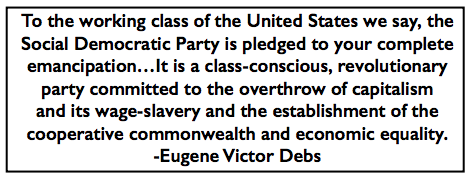 ———-
———-
Hellraisers Journal – Sunday March 18, 1900
San Francisco’s Class Struggle of March 17th Claims “Unity Achieved”
The first national convention of the Social Democratic Party of America was called to order Tuesday morning, March 6, 1900 by Chairman Jesse Cox, at Reichwein’s hall, Indianapolis, Ind. The Class Struggle of March 17th, official organ of the Socialist Labor Party of California, described the convention in detail in an article written by Editor G. B. Benham.
[Part I of II.]
At 10 o’clock am Tuesday, March 6th, the convention was called to order and William Mailly, editor of the Haverhill Social Democrat, was elected chairman. Strickland was made secretary and Johnson of Chicago and Val Putnam of St. Louis assistant secretaries.
The usual committees were appointed, and an order of business was adopted. The credentials committee had an amount of work that does not usually fall to such committees, for the arrangement and basis of representation is not of the character generally used in representative bodies. Any number of members may sign the credentials of a delegate and his vote in the convention is the vote of the number who signed the credentials. Any local organization can thus send as many delegates as they desire. In fact a member can send himself, sign his own credentials, and his voice is recorded as one vote on the floor of the convention, but the vote depends entirely upon the number of signers of the credentials. Thus Margaret Haile has 196 votes, and Martin of Ohio has 1 vote.
The total number of delegates present was 67, representing 17 states, showing total membership represented 2,043.
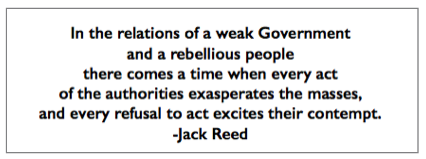
~~~~~~~~~~~~~~~~~~~~~~~~~~~~~~~~~~~~~~~~~~~~~
Hellraisers Journal – Friday December 27, 1918
New York, New York – Jack Reed & Art Young on Second Masses Trial
From The Liberator of December 1918:
-Defense Attorney Seymour Stedman by Art Young
SEYMOUR STEDMAN, attorney for the defense, in his eloquent summing up, referred as follows to the fact that the Masses editors asked an injunction compelling the Post Office to mail the very magazine for publishing which they were later indicted:
Do men who are committing a crime go into a Federal Court and face a District Attorney and ask the privilege of continuing it? A strange set of burglars! A strange set of footpads! A strange set o smugglers! A strange set of criminals! I ask Mr. Barnes to tell you when before in his experience, men in the City of New York came in and filed an appeal, opening all their proof and all their evidence and all their testimony and said, “if the Court please, we insist on the right to continue this deep, dark, infamous conspiracy, and have it sanctified by an advocate of the United States Court.” History finds no parallel that I know of in any criminal procedure which has ever taken place.
-John Reed on Second Masses Trial
About the Second Masses Trial
by John Reed
IN the United States political offenses are dealt with more harshly than anywhere else in the world. In the amendment to the Espionage Act [the Sedition Act] it is made a crime equivalent to manslaughter to “criticize the form of government.” The sentences in Espionage cases run anywhere from ten to twenty years at hard labor, with fines of thousands of dollars.

~~~~~~~~~~~~~~~~~~~~~~~~~~~~~~~~~~~~~~~~~~~~~
Hellraisers Journal – Friday December 4, 1908
The Journey of Red Special as Told by Charles Lapworth
In this month’s edition of the Review, Comrade Lapworth tells the inspirational story of the journey of the Red Special which carried Eugene Debs, the presidential candidate of the Socialist Party of America, across the nation, ending with a big rally and last campaign speech at Terre Haute.
From the International Socialist Review of December 1908:
The Debs Red Special
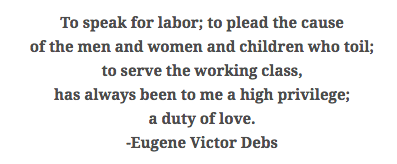 ~~~~~~~~~~~~~~~~~~~~~~~~~~~~~~~~~~~~~~~~~~~~~
~~~~~~~~~~~~~~~~~~~~~~~~~~~~~~~~~~~~~~~~~~~~~
Hellraisers Journal – Tuesday November 12, 1918
Max Eastman on the Federal Trial of Eugene Debs at Cleveland
From The Liberator of November 1918:
-Note: Comrade Debs was convicted of violating the Espionage Act in Federal Court in Cleveland on September 12, 1918.
The Trial of Eugene Debs
By Max Eastman
AT a Russian Socialist convention held in Stockholm in 1907 it was estimated that the delegates-140 of them-had spent, collectively, one hundred and thirty-eight years, three months and fifteen days in prison. They had been in exile one hundred and forty-eight years, six months and fifteen days. The length of time the convention as a whole had been active in Socialist propaganda was 942 years.
“It follows,” says Trotsky in a preface to one of his books, “that the time spent in prison and exile is about one-third of the time a Social-Democrat is active.” Reading that preface on my way west to attend the trial of Eugene Debs, I was struck by Trotsky’s unconscious assertion that the time spent in prison is part of the time that a Socialist is “active.” It is often the time that his influence is most active. And though the government may succeed in accelerating the immediate war program by imprisoning Debs, they will also accelerate the effect of his life-long service to the social revolution.
Whatever else he may be, Debs is the spiritual chief and hero of American Socialism, and I find myself in a very real perplexity in trying to report his trial on a charge of obstructing the war program. I believe that the postal authorities will recognize the necessity I am under, as a Socialist editor, of giving this news to the readers of the LIBERATOR. And, of course, I cannot write the news without some special appreciation of his life and character and the elevation of his motives. Yet, on the other hand, I recognize the necessity that the postal authorities are under of keeping out of circulation anything designed to obstruct the war program of the government. Therefore I assure the reader in advance, not only that I shall not quote or refer to anything that Debs said about the war, but that I shall not in any indirect way imply any such quotation or reference; or any discussion of what he said. As a Socialist, bidding a kind of temporary hail and farewell to a companion who is dear to the hearts and minds of millions of Americans-whether pro-war or anti-I write the news of his trial for Socialists.
When I slipped into the court-room at Cleveland a pretty young man in a pressed suit and a bow tie was reading Debs’ speech at Canton to the jury. He was manifestly embarrassed to find so much eloquence in his mouth. Debs was never younger, more spirited, more full of love and irony, than he was in that speech of June 16th.